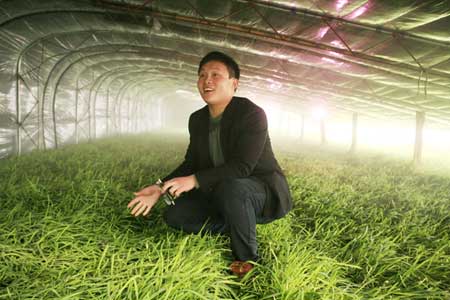 |
|
Chai Huilong surprised his parents and fellow villagers when he chose to return to his hometown and farm the Chinese leek after he graduated from university. Ju Chuanjiang / China Daily |
|
When university graduate Chai Huilong turned down a well-paid job to return to the family farm, his parents were worried. But the young entrepreneur has proved farming can provide a prosperous future. Zhao Ruixue reports in Jinan. University graduate Chai Huilong, 24, made a small fortune from his farm last year, but his mother refuses to forgive him for returning to the small village he grew up in. "I would still prefer him to stay in the city because it is decent," says Cui Changyun, Chai's 50-year-old mother. In 2012, Chai declined an offer of a well-paid job in a city and instead decided to return to his hometown, Chaijia village, to farm the Chinese leek. But far from being delighted to have their son at home, Chai's decision was strongly opposed by his parents. "My mother cried for a week. She was afraid of being laughed at by our fellow villagers. To them, my returning means I have to live a very hard life as they do, but I have proved them wrong," Chai says. Chaijia village is about 60 km from Jinan, capital of Shandong province. Visitors to the village during the spring farming season may notice a defining characteristic - an absence of young men. "Men aged between 20 and 40 will not stay at home. They prefer to work in the city even though some of them can only earn about 1,000 yuan ($161) a month," Chai says. "It's not an impulsive decision," Chai says of his return. His four years of study in finance and international trade at Beijing Science and Technology University convinced Chai that his hometown has the potential to become a wealthy area. Chaijia is a village with over 30 years' experience of planting the Chinese leek. Of the 400 families in the village, 355 are responsible for planting 100 hectares of Chinese leek. In 2000, the village had its produce registered as Luxiang Pollution Free Leek at China's Agriculture Ministry, the first registered brand of Chinese leek. However the branding has done little to improve the farmers' lives.
|
对于跳出农门上了大学的农村孩子来说,进入都市往往是他们的梦想,而1989年出生的柴会龙却放弃了年薪20万的城市工作,大学毕业后回到家乡跟父母种起韭菜,开始了他的家庭农场新梦想。 大半年下来他的家庭农场小有成就,今年春节前后卖了一季的韭菜就净赚了30多万。 尽管如此,柴会龙50岁的母亲仍然会抱怨他回家乡种菜。 “好不容易考上大学,毕业后又回来种地。虽然挣了一些钱,可种地多累啊,也不体面,即便是收入少我还是愿意他在城市里工作。”柴会龙的母亲崔长云说。 2012年7月,柴会龙从北京科技大学毕业后,决定放弃一家公司的总经理助理职务和高薪酬,选择回家创业种韭菜。当他把这个决定告诉他父母时,遭到了双亲的强烈反对。 “我妈听说我要回家种地,哭了一个星期。”柴会龙回忆说。 柴会龙告诉中国日报记者,在他们村见不到20岁到40岁之间的人,年轻人没有选择在家里种地的,大学生更不会回来,丢不起人。 “我回家创业的决定不是一时冲动。”柴会龙对记者说。 大学一年级时的职业规划课上, 老师请每位学生给父母写一封信,描述“四年之后你在哪里”。在这封信里,19岁的柴会龙写道,如果四年之后,家乡的韭菜还没有走向全国,甚至出口国外,自己将回到家乡,实现这个梦想。 凭借着自己的调查和知识积累,柴会龙相信自己的村庄那一方沃土会种出全国最好的韭菜。 章丘市柴家村,种植韭菜的历史已有30多年,有1500亩特色品牌基地,355户人家种韭菜。并于2000年在农业部注册了绿色无公害韭菜,但这个品牌并没有给柴家村农民带来更多的利润。 于是,柴会龙毅然决然带着知识和资本回到家乡创业。 |